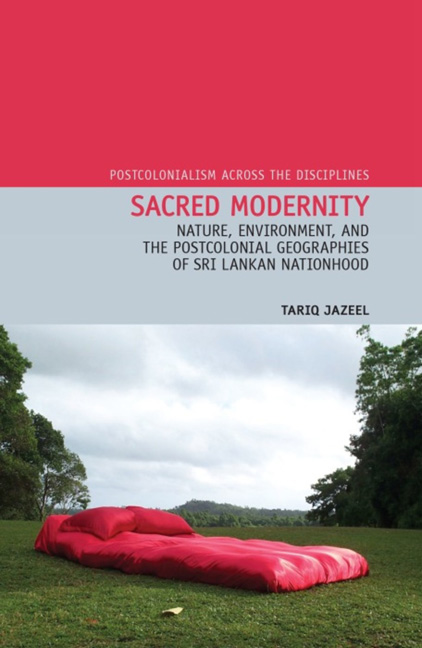Book contents
- Frontmatter
- Dedication
- Contents
- List of Map and Figures
- Acknowledgements
- Introduction
- 1 Sacred Modernity: Nature, Religion, and the Politics of Aesthetics
- Part I Ruhuna (Yala) National Park
- Part II Tropical Modern Architecture
- 5 Built Space, Environment, Modernism: (Re)reading ‘Tropical Modern’ Architecture
- 6 Architecting One-ness: Fluid Spaces/Sacred Modernity
- 7 Over-determinations: Architecture, Text, Politics
- Conclusion: Sri Lankan Nature as Problem Space
- Bibliography
- Index
7 - Over-determinations: Architecture, Text, Politics
from Part II - Tropical Modern Architecture
- Frontmatter
- Dedication
- Contents
- List of Map and Figures
- Acknowledgements
- Introduction
- 1 Sacred Modernity: Nature, Religion, and the Politics of Aesthetics
- Part I Ruhuna (Yala) National Park
- Part II Tropical Modern Architecture
- 5 Built Space, Environment, Modernism: (Re)reading ‘Tropical Modern’ Architecture
- 6 Architecting One-ness: Fluid Spaces/Sacred Modernity
- 7 Over-determinations: Architecture, Text, Politics
- Conclusion: Sri Lankan Nature as Problem Space
- Bibliography
- Index
Summary
works of art are not received as single entities, but within the institutional frameworks and conditions that largely determine the function of the works.
Peter Burger, Theory of the Avant-garde (1984), p. 12Architecture is dependent on others at every stage of its journey from initial sketch to inhabitation.
Jeremy Till, Architecture Depends (2009), p. 45Just moments after the architect Channa Daswatte spoke of a ‘sacredness’ inherent in good design (see Chapter 6), I asked him w hether he thought there was anything at all political about tropical modernism in the context of Sri Lanka's national question. He was vehement that there was nothing either religious or political about the materiality of the architecture itself. However, at once he stressed that the problem is that tropical modern architecture can be, and has been, one of those things that Sinhala-Buddhist nationalists latch onto, co-opt, for their own political ends; like education was, like language was. His defence of the genre raises an im portant point. The admission that the architecture has been latched onto somehow, reveals w hat I w ant to show in this chapter is the very impossibility of artistic autonomy. In the context of its environmental resonances then, tropical modernity's aesthetic domains are always partly shaped by a myriad of extra-architectural factors and assemblages. With all the will in the world, contemporary architects like Channa Daswatte cannot control how their built spaces come to mean in a particular kind of way. Not only does the historical weight of the genre itself weigh down upon them, their work circulates through institutions, representational economies, and markets in ways that as I explore in this chapter over-determine the meaning of tropical modern materialities and environments, as well as the cultural logic of living inside/out that those materialities afford. As much as Bawa's and de Silva's early and self-conscious ‘post-colonial’ narrativizations of their style, it is these excessive constellations that forge tropical modernism's cultural and political effects. It is to some of these over-determining assemblages of Sri Lankan nature as it is experienced in and through tropical modern architecture that I turn in this chapter.
- Type
- Chapter
- Information
- Sacred ModernityNature, Environment and the Postcolonial Geographies of Sri Lankan Nationhood, pp. 145 - 165Publisher: Liverpool University PressPrint publication year: 2013



